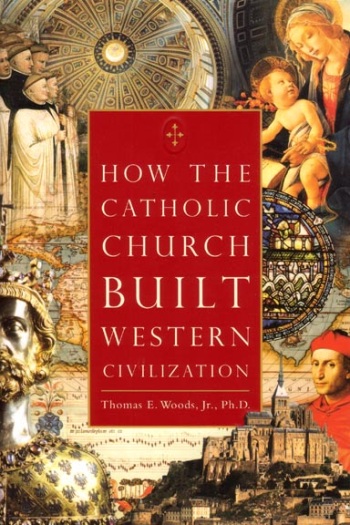
We've been pleasantly surprised to discover that our local library has stocked a copy of Professor Thomas E. Woods' book How the Catholic Church Built Western Civilization.
Professor Woods laments the fact that large numbers of young people have been conditioned, through the media and popular culture, to associate the Catholic Church with corruption. He notes that this is exacerbated by high school and college courses which suggest that the Catholic Church brought only ignorance, intellectual repression and strict conformity. He highlights a book called Second Messiah as a typical example of this phenomenon. The authors of this text erroneously claim: 'Everything that was good and proper was despised and all branches of human achievement were ignored in the name of Jesus Christ.' This kind of blasphemy is an insult to God and the Church. It can also serve to close the minds - and gradually the hearts - of uninformed young people to the saving Person of Jesus Christ and His Holy Church.
In a series of accessible and engaging chapters, Professor Woods dispels the myth - indeed the lie - which is so frequently spread through contemporary education systems with regard to the Catholic Church. Through the solid facts and historical research of his book, Professor Woods shows that 'civilization', rather than 'corruption', has been the enduring hallmark of the Catholic Church.
In addition to discussing the remarkable contributions made by the Church in the fields of art, architecture, literature and music, Professor Woods demonstrates; that modern science was born in the Catholic Church; how the popular understanding of the Galileo affair is wrong; the fact that Catholic priests developed the idea of the free-market economy five hundred years before Adam Smith; how Western law grew out of Church canon law; how the idea of formulated human 'rights' also grew out of canon law, long before the influence of John Locke or Thomas Jefferson; that the Church's commitment to the poor - both in its spirit and its sheer scope - was something new in the Western world and represented a dramatic improvement over the standards of classical antiquity; and how the West was humanized by the Church's insistence on the sacredness of all human life.
How the Catholic Church Built Western Civilization is an important resource to help clear some of the 'stones' which may be blocking the minds and hearts of catechumens, young parishioners and family members from receiving the Good News of Jesus Christ and His Church. It is also a helpful resource for going deeper into the subject matter through its bibliographical references to such great authors as Christopher Dawson, Etienne Gilson, David Knowles and Erwin Panofsky. As such it would prove helpful to parish priests, teachers, home-schooling families, and indeed to all parents who are concerned to hand on the truth to their children. Â
In a concluding chapter, Professor Woods contrasts the glories of Christendom with the descent into atheistic nihilism; which has typified recent centuries and now holds sway throughout the West. Professor Woods notices the paradox, which we have mentioned before, that the importance of the Church to Western civilization is sometimes made clearer in comparison to the spiritual collapse of our culture.
Professor Woods quotes Jude Dougherty, the dean emeritus of the School of Philosophy at Catholic University, who reflects: 'Without a metaphysical recognition of the transcendent... Man himself becomes the measure, unaccountable to an objective order. Life itself is empty and without purpose.' Professor Woods explores briefly the negative impact this androcentric worldview has had, by considering its corrosive impacts on art, literature, music and philosophy.
Professor Woods notes that a key practical result of this loss of the Faith has been the dramatic reduction in childbirth. Today, Europe no longer even believes in itself enough to continue through replacement levels of children. He also recalls the fact that the EU constitution could not bring itself to even acknowledge the continent's Catholic heritage. As a result Woods laments: 'Many of the great cathedrals that once testified to the religious convictions of a people have in our own day become like museum pieces, interesting curiosities in an unbelieving world.'
At the end of the book, Professor Woods quotes the French philosopher, Simone Weil: 'I am not a Catholic'... 'but I consider that the Christian idea, which has its roots in Greek thought and in the course of the centuries has nourished all of our European civilization, as something that one cannot renounce without becoming degraded.'
How much more this is the case, when we know that the Christian idea is more than just a concept. The heart of the Church is a Person; Jesus Christ, the God-Man. He is the One, Who came to save us from our sins - and from the eternal fires of Hell which they deserve - and to lead us into eternal communion with the Blessed Trinity by means of His Church. Without Jesus Christ and the Church He founded, we risk more than degradation or the loss of a temporal civilization. Such losses are only a sign of the eternal spiritual devastation which we may face.Â
Professor Woods believes that the West is learning its lessons the hard way. We must pray that these will be learned and acted on whilst there is still time.



